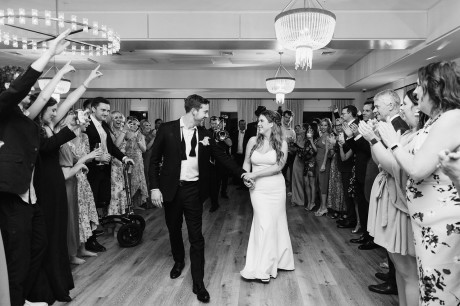In the midst of all the daydreams of frothy gowns, sprigs of flowers, color palettes, cake tasting and music playlists, there are a few conversations that must be had with your new fiancé before the “fun planning” can truly begin. There’s the size of the wedding—which can be difficult to narrow down if you’re not already on the same page—but first and foremost, there’s the dreaded B-word. It will rear its ugly head, and you’ll need to face it head on. So, let’s just rip off that band-aid, and say it together. Ready? BUDGET.
Painful, right? The thing is, it doesn’t have to be if you approach it from a perspective of necessity rather than stress. But before you can get into the actual numbers, you need to come to the table prepared to talk, and that includes knowing who’s paying for the wedding. Will you as the couple be footing the bill, both families chipping in, or are you following the traditional route of one of the families paying for the majority of expenses?
If either or both families will have a hand in the expenses, they should be included in the budget conversation. Ideally, you’ll already know from previous conversations with family if they’ll be assisting, but it’s still a good idea to sit down with them and confirm one way or another before you give guarantees to your partner. When family is paying for all or part of the wedding, you need to have an honest conversation with them about what they can financially swing. Expectations can be the biggest downfall in budgeting. Hear them out, then sit down with your fiancé and decide if you’ll graciously accept or decline what’s being offered and whether or not you’ll be bolstering those numbers with your own finances to get the wedding of your dreams.
If you and your partner are financially involved in the day, knowing your own budget is vital. Are you pulling from savings, or going into debt? Overextending yourselves may seem like a good idea in the moment to achieve your perfect day, but in the long run there may be some regrets when that money isn’t available for other short and long-term goals. Do you own your own home, or are you saving for one? Are you going away for your honeymoon? Do you want to start a family sooner rather than later? Do you plan on vacationing regularly? These are all financially dependent conversations, that affect how much you’re willing to allot to your wedding budget.
According to the most recent WeddingWire Newlywed Report, the average couple pays for roughly half of the bill, while parents are covering just slightly more. These numbers can and do vary based on age, if it’s a first or second marriage, and whether or not the couple is LGBTQ.
Something that often happens, regardless of who’s paying, is under-budgeting. On a nationwide average, couples budget $23,000 but end up spending closer to $30,000. For our Delaware and Maryland couples those final numbers are $28,970 and $34,503, respectively. Give yourselves a cushion when finalizing your budget because chances are it will only increase once you start researching vendors. Most of those increases happen in the photography, food, attire, and venue departments.
This is where you and your fiancé must decide what elements of the wedding are the most important to you. Do you want your wedding to be small and intimate, or over-the-top large and memorable? How important is the overall aesthetic, guest experience, food, music, venue, or photography? Knowing the elements you’re likely to splurge on can help you know which directions to allot more money versus the areas you can scale back in.
Finding a wedding budget tracker is an excellent way to keep track of your spending. With so many available, we won’t add one more to the mix but rather suggest a few features to look for when choosing one. Look for an app (on-the-go tracking makes life so much easier!) that has an estimated budget as well as final cost breakdowns, includes vendor details with sections for pricing and notes, tracks your outgoing and incoming payments, and monitors where you’re spending the most money so you can regularly review and adjust priorities.
Budgeting may be a scary prospect, but it’s an excellent opportunity to have a heart-to-heart with your fiancé about what you’re both envisioning for your wedding day. It’s also a good time to discuss finances and learn what your partner prioritizes when it comes to spending money. This may be one of the biggest days of your lives, but that doesn’t mean you have to get lost in the planning. You’re arranging this event to show your love and commitment to each other, and at the core of it all, that’s what this day is really about—not the money.
Banner Photo: jtyler / Collection iStock via Getty Images











